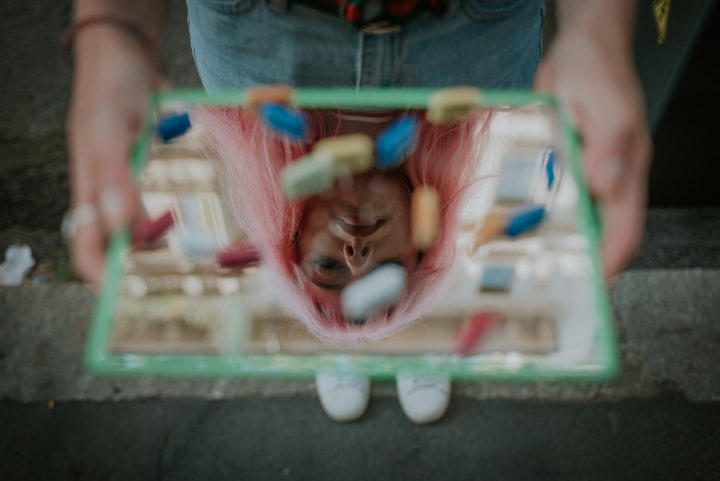
I’m not a psychologist, but this is an attempt to analyze and apply neurology to depression. Although it might seem to be an apathetic approach, I think it’s better in the long run to work with what we can work with instead of pretending we can help or make attempts that don’t seem to be working. We can try, but logic and analysis make up the backbone to the chaotic sea of emotions.
Your brain has neurotransmitters that channel messages that travel throughout your body. When over time, faulty connections occur and messages aren't ‘managed’ by the brain, these patterns can what is labeled as depression. Since it is happening in your brain, it is counterintuitive to think about something that you try to escape, and you do, because the brain craves dopamine, serotonin and adrenaline, not glutamine.
Depression is a result of something that hasn’t been confronted, distinguishing healthy from unhealthy thinking patterns, or so it seems. There is a need for mental stability, in a way, to think about our instability. “Most probably future AI will help us greatly with the process of diagnosing mental disturbances such as depression with deep accuracy. So far we do diagnose mental issues but such diagnoses are basically based on comparative analyses and theories, not really on evidence based elements, also considering how psychology is not a matter of study that can be tested nor replicated in a lab, like other sciences such as biology, physics, chemistry and so on (Fontanive, 2019).”
“Additionally, so far we cannot monitor a brain’s behaviors and functioning from within when that brain is alive. We can run brain scans and understand the operations and activations of the various areas of the brain but we can’t decode what the brain actually does from within the brain. Most likely the future of nanotechnologies combined with AI computing will help us understand how the brain operates with great accuracy and via non-invasive manners (Fontanive, 2019).”
The series of messiness and corruption that leads to the result is fought at, probably because of the reptilian need of fight, flight, or freeze.
What’s also counterintuitive is connecting with people who are likewise depressed, and then they both try to escape to return to unhealthy messiness.
One of the main faults in psychotherapy is that therapists might start to talk about themselves rather than talk to patients about them. Another note: just because you have bad luck with one psychiatrist, does not mean they are all thinking the same, faulty or make-intended thinking.
For others it was different. I’ve had three close friends who at one post or another, reached the point of wanting to commit suicide. Even if they did not get to that point, there are other disorders which can only observe as them acting unsafe (deciding to run off in a foreign country because they get angry at you thinking you know the map and they don’t, for example… that was a dramatic night of sliding I’d prefer to keep to myself, but the gist might be familiar).
“The problem with the suicide rate and modern therapy highlights how modern psychotherapy is actually failing to handle and reduce the problem. The current state of suicide rates is that suicides are increasing dramatically, almost epidemically, especially in the western world.
Modern psychology is also not really that modern since it is based on theories and approaches, most of which are obsolete and not impacting.
Another problem with psychology and psychologists is that a psychologist should not be a professional that tells clients what to do. When a psychologist believes the purpose of a psychologist is to tell people what to do; that psychologist requires a good psychologist telling him what not to do (Fontanive, 2019)!”
Yesterday there was a recollection of ambulances - five - that showed up throughout this past year, which was a shock to them. It caused a bombshell of messiness, actually, but I didn’t know how to respond. At least, I thought, somebody was doing their job, whatever it was.
Of course it was complicated. Much more complicated. But that complication, in a way, is probably an adrenaline rush in disguise. We want that ‘fear.’ We want to hurt ourselves. Or, at least, we’d prefer our way of getting better than other, healthy advice. We also ignore being able to have moments of stability and use it to our capabilities (not advantages) since seems many are capable but just don’t want to make an effort to help themselves. They think they help themselves, but the results and series of results say otherwise.
What is interesting and ignored in the process of drinking alcohol, for example, is that alcohol deprives you of water necessary to get your blood flowing to the brain. If you don’t eat, the brain is exhausted. Rather than measure calories and compare to exercise and data results, we get rid of sugar altogether or something in an attempt to feel better. The advice that actually is healthy takes more effort to apply, which entails thinking.
Going on social media to ask your friends to help you with depression will inevitably get responses that are superficial because they want to help but don’t want to hurt you. But they don’t know how to help. The self-promotion of your life is vague blurbs of result of something we don’t know about.
“Seeking whatever kind of things on social media / internet presumably or believed capable to somehow compensate positively with depressive states of mind and moods is a modern inclination that characterizes the manners through which we use our digital selves, and it is a very toxic one! Digital dopamine seeking indeed is extremely counterproductive, psychologically speaking, and in fact often even toxic to the mind of those who cling to that attitude, as well and indeed the outcomes of it usually result into receiving, accumulating and eventually even assimilating and storing all sort of silly, shallow, intellectually sterile, fake news/confirmation bias-based and non-intelligent advice. So the mind of the dopamine seeker that clings to such a venomous digital inclination, instead of finding thinking tools capable of making such a mind reason carefully and soberly about its own depression, finds instead a concatenation of information and digital behaviors that make such a mind more and more intoxicated by dull things and therefore it gets even more miserable, acritical, desolated and ergo depressed (Fontanive, 2019).”
If you want to have a conversation, also, why does it need to be on social media for others to see? We then have a competition and a challenge: to respond because your reaching out for help, and to avoid attacks on our real response. So it’s superficial: “I hope you feel better.” “They don’t know what they lost. I’m glad you left him/her.” One thing I do agree with is: “depression is complicated.” Interestingly, this comment was ignored. Depression, furthermore, might even be an illusion and consequence / result of unhealthy thinking. In fact, it’s the masochistic twin to what people call evil, the result of unhealthy thinking and actions.






Comments
There are no comments for this story
Be the first to respond and start the conversation.